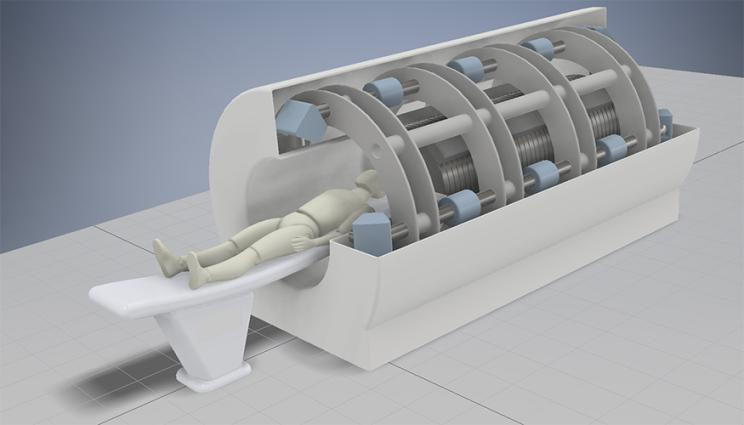Studies published in the past few years show that high radiation dose rates over short periods of time may improve cancer therapy. Called “FLASH Radiotherapy” or “FLASH-RT”, the method causes less damage to healthy tissue than lower radiation doses given over a longer period of time. This technique requires controlling not only the total dose, but also the dose rate. LLNL researchers have developed the technology that can control the dose rate that is high enough to kill cancer cells, yet short enough to avoid damaging healthy cells.
LLNL’s approach is to use their patented Photoconductive Charge Trapping Apparatus (U.S. Patent No. 11,366,401) as the active switch needed to discharge voltage across a vacuum gap in a particle accelerator, like the one described in their other patent (U.S. Patent No. 7,710,051). These active switches enable adjusting the beam current, final energy, and temporal behavior of the particle beam. The pulsed source for such a system can use the capacitors as described in LLNL’s U.S. Patent No. 10,270,368.
As the energy source for the FLASH-RT system, this technology promotes the use of a linear induction accelerator (LIA) utilizing the opticondistor (optical transconductance varistor) for ultrafast switching and control. To achieve the required voltage for the accelerator cavities, the parallel charging series output switching configuration described in LLNL’s U.S. Patent No. 10,270,368 can be used.
Researchers at LLNL have shown the potential for LIAs to deliver effective, targeted doses of “FLASH” radiation to cancer patients. The new technique can selectively kill cancer cells with minimal damage to healthy cells.
Publication:
Sampayan, S.E., Sampayan, K.C., Caporaso, G.J. et al. Megavolt bremsstrahlung measurements from linear induction accelerators demonstrate possible use as a FLASH radiotherapy source to reduce acute toxicity. Sci Rep 11, 17104 (2021). https://doi.org/10.1038/s41598-021-95807-9
- Less damage to healthy tissue à improved cancer therapy over conventional X-Ray therapy
- Applicable to Intensity-Modulated Radiation Therapy (IMRT)
- Applicable to a compact linear accelerator
FLASH Radiotherapy (FLASH-RT) in the field of Radiation Oncology
Current stage of technology development: TRL 2 (Component and/or system concept formulated)
LLNL has filed for patent protection on this invention and has a number of patents associated with Flash Radiotherapy Accelerators.
US Patent No. 7,710,051 Compact Accelerator for Medical Therapy, issued 05/04/2010
US Patent No. 10,270,368 Bi-directional, Transformerless Voltage System, issued 04/23/2019
US Patent No. 11,366,401 Photoconductive Charge Trapping Apparatus, issued 06/21/2022
US Patent Application Publication No. 2022/0203135 Flash Radiotherapy Accelerator, published 6/30/2022
US Patent Application Publication No. 2022/0219014 Flash Radiotherapy Accelerator System, published 7/14/2022
US Patent Application Publication No. 2022/0308471 Photoconductive Charge Trapping Apparatus, published 9/29/2022


